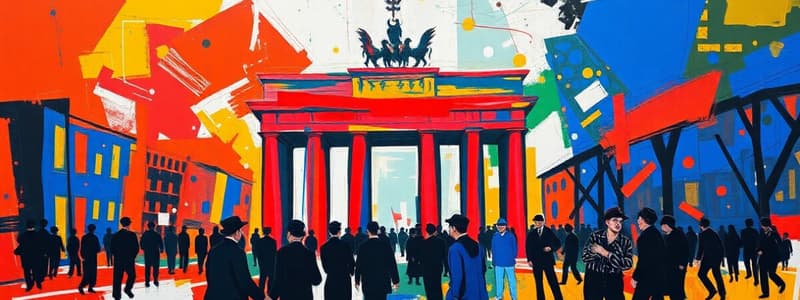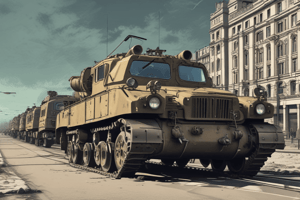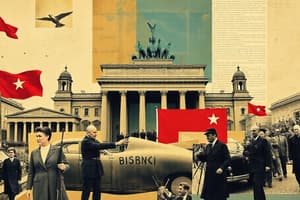Podcast
Questions and Answers
What was the primary reason for the construction of the Berlin Wall?
What was the primary reason for the construction of the Berlin Wall?
- To create a physical barrier between the two Germanys.
- To stop East Germans from fleeing to the West. (correct)
- To protect East Berlin from potential attacks from West Berlin.
- To prevent the spread of communism into West Berlin.
Which event significantly contributed to the construction of the Berlin Wall?
Which event significantly contributed to the construction of the Berlin Wall?
- The Vienna Summit of 1961 (correct)
- The launch of Sputnik 1
- The Cuban Missile Crisis.
- The Bay of Pigs Invasion
What was the impact of the Berlin Wall on relations between the superpowers?
What was the impact of the Berlin Wall on relations between the superpowers?
- It significantly worsened tensions between the US and USSR.
- It temporarily improved relations between the US and USSR. (correct)
- It led to a period of détente between the US and USSR.
- It had little to no impact on the relationship between the superpowers.
Why was the US unable to prevent the construction of the Berlin Wall?
Why was the US unable to prevent the construction of the Berlin Wall?
What was the symbolic significance of Kennedy's visit to West Berlin in 1963?
What was the symbolic significance of Kennedy's visit to West Berlin in 1963?
What was the main reason for the Cuban Revolution?
What was the main reason for the Cuban Revolution?
How did Fidel Castro's government respond to the US ban on Cuban sugar imports?
How did Fidel Castro's government respond to the US ban on Cuban sugar imports?
What was the primary objective of the Bay of Pigs Invasion?
What was the primary objective of the Bay of Pigs Invasion?
Why did the Bay of Pigs Invasion fail?
Why did the Bay of Pigs Invasion fail?
What was the major consequence of the Bay of Pigs Invasion on the relationship between Cuba and the USSR?
What was the major consequence of the Bay of Pigs Invasion on the relationship between Cuba and the USSR?
What was the primary factor that fueled the arms race between the US and the USSR during the Cold War?
What was the primary factor that fueled the arms race between the US and the USSR during the Cold War?
Which of the following events can be considered a major turning point in the Space Race?
Which of the following events can be considered a major turning point in the Space Race?
How did the Cuban Missile Crisis influence the Cold War?
How did the Cuban Missile Crisis influence the Cold War?
What was the main reason for Khrushchev's willingness to place nuclear missile in Cuba?
What was the main reason for Khrushchev's willingness to place nuclear missile in Cuba?
What was the main reason for Kennedy’s reluctance to use military force to remove the Soviet missiles from Cuba?
What was the main reason for Kennedy’s reluctance to use military force to remove the Soviet missiles from Cuba?
Which of the following statements accurately reflects the impact of the Cuban Missile Crisis on US-Soviet relations?
Which of the following statements accurately reflects the impact of the Cuban Missile Crisis on US-Soviet relations?
What was one significant reason for the Berlin Crisis involving East and West Germany?
What was one significant reason for the Berlin Crisis involving East and West Germany?
What did Khrushchev demand in his Berlin Ultimatum?
What did Khrushchev demand in his Berlin Ultimatum?
Which event marked a significant collapse in US-Soviet negotiations regarding Berlin?
Which event marked a significant collapse in US-Soviet negotiations regarding Berlin?
How did the West view Khrushchev's Berlin Ultimatum?
How did the West view Khrushchev's Berlin Ultimatum?
Which of the following was a consequence of the significant refugee flow from East to West Berlin?
Which of the following was a consequence of the significant refugee flow from East to West Berlin?
During which summit did Khrushchev agree to withdraw his Berlin Ultimatum?
During which summit did Khrushchev agree to withdraw his Berlin Ultimatum?
How did the number of defectors from East to West Berlin change by the summer of 1961?
How did the number of defectors from East to West Berlin change by the summer of 1961?
What was a key factor in the escalation of tensions during the Berlin Crisis?
What was a key factor in the escalation of tensions during the Berlin Crisis?
What was the main goal of Alexander Dubcek's reforms in Czechoslovakia in 1968?
What was the main goal of Alexander Dubcek's reforms in Czechoslovakia in 1968?
Which event marked the beginning of the Prague Spring?
Which event marked the beginning of the Prague Spring?
What was one of the reactions of the Western countries to the Soviet invasion of Czechoslovakia in 1968?
What was one of the reactions of the Western countries to the Soviet invasion of Czechoslovakia in 1968?
What was the Brezhnev Doctrine primarily concerned with?
What was the Brezhnev Doctrine primarily concerned with?
What was a significant impact of the Soviet invasion on Czechoslovakia's political landscape?
What was a significant impact of the Soviet invasion on Czechoslovakia's political landscape?
Which leader replaced Dubcek and reinstated a hardline communist regime?
Which leader replaced Dubcek and reinstated a hardline communist regime?
What action did Dubcek take following the invasion of Czechoslovakia by the USSR?
What action did Dubcek take following the invasion of Czechoslovakia by the USSR?
What was the primary reason for the Soviet invasion of Czechoslovakia in August 1968?
What was the primary reason for the Soviet invasion of Czechoslovakia in August 1968?
How did Czechoslovakia's economy struggle under Soviet control in the 1960s?
How did Czechoslovakia's economy struggle under Soviet control in the 1960s?
What was one of the main demands of the Czech people prior to the reforms?
What was one of the main demands of the Czech people prior to the reforms?
Which of these reasons did Krushchev give for placing missiles in Cuba?
Which of these reasons did Krushchev give for placing missiles in Cuba?
What was the main concern within the US after the discovery of Soviet missile bases in Cuba?
What was the main concern within the US after the discovery of Soviet missile bases in Cuba?
Why did Kennedy initially consider ignoring the Soviet missiles in Cuba?
Why did Kennedy initially consider ignoring the Soviet missiles in Cuba?
What was the main reason why Kennedy rejected the option of attacking Cuba with nuclear weapons?
What was the main reason why Kennedy rejected the option of attacking Cuba with nuclear weapons?
What was the main reason why Kennedy favored a naval blockade of Cuba?
What was the main reason why Kennedy favored a naval blockade of Cuba?
Which of the following was a consequence of the Cuban Missile Crisis for Krushchev?
Which of the following was a consequence of the Cuban Missile Crisis for Krushchev?
What was the most immediate consequence of the Cuban Missile Crisis for relations between the Soviet Union and China?
What was the most immediate consequence of the Cuban Missile Crisis for relations between the Soviet Union and China?
What was a major long-term consequence of the Cuban Missile Crisis for the Soviet Union?
What was a major long-term consequence of the Cuban Missile Crisis for the Soviet Union?
What was the main idea behind the doctrine of Mutually Assured Destruction (MAD)?
What was the main idea behind the doctrine of Mutually Assured Destruction (MAD)?
What was the purpose of the hotline established between the US and USSR in 1963?
What was the purpose of the hotline established between the US and USSR in 1963?
Which of the following agreements was signed by the US, USSR, and UK in 1963?
Which of the following agreements was signed by the US, USSR, and UK in 1963?
Why did France leave NATO in 1966?
Why did France leave NATO in 1966?
Which of the following is an example of a 'dove' during the Cuban Missile Crisis?
Which of the following is an example of a 'dove' during the Cuban Missile Crisis?
Which of the following best describes the concept of 'détente'?
Which of the following best describes the concept of 'détente'?
What was the main reason why the US and USSR were considered to be on equal footing in terms of nuclear capability by 1965?
What was the main reason why the US and USSR were considered to be on equal footing in terms of nuclear capability by 1965?
Flashcards
Détente
Détente
The easing of tensions between the USA and USSR during the Cold War.
Prague Spring
Prague Spring
A period of political liberalization in Czechoslovakia during 1968 under Dubcek.
Antonin Novotny
Antonin Novotny
Leader of Czechoslovakia from 1957 until his replacement in 1968, known for Stalinist policies.
Alexander Dubcek
Alexander Dubcek
Signup and view all the flashcards
Brezhnev Doctrine
Brezhnev Doctrine
Signup and view all the flashcards
Warsaw Pact
Warsaw Pact
Signup and view all the flashcards
Censorship
Censorship
Signup and view all the flashcards
Civil disobedience
Civil disobedience
Signup and view all the flashcards
Economic repression
Economic repression
Signup and view all the flashcards
Non-violent resistance
Non-violent resistance
Signup and view all the flashcards
Cuban Missile Crisis
Cuban Missile Crisis
Signup and view all the flashcards
Nuclear deterrence
Nuclear deterrence
Signup and view all the flashcards
Khrushchev's reasoning
Khrushchev's reasoning
Signup and view all the flashcards
The Hawks
The Hawks
Signup and view all the flashcards
The Doves
The Doves
Signup and view all the flashcards
Thirteen Days
Thirteen Days
Signup and view all the flashcards
Hotline
Hotline
Signup and view all the flashcards
Test Ban Treaty
Test Ban Treaty
Signup and view all the flashcards
Nuclear Non-proliferation Treaty
Nuclear Non-proliferation Treaty
Signup and view all the flashcards
Mutually Assured Destruction (MAD)
Mutually Assured Destruction (MAD)
Signup and view all the flashcards
Cuban Missile Bases
Cuban Missile Bases
Signup and view all the flashcards
Khrushchev's downfall
Khrushchev's downfall
Signup and view all the flashcards
Diplomatic negotiations
Diplomatic negotiations
Signup and view all the flashcards
Arms race
Arms race
Signup and view all the flashcards
NATO tensions
NATO tensions
Signup and view all the flashcards
Berlin Crisis
Berlin Crisis
Signup and view all the flashcards
East vs West Germany
East vs West Germany
Signup and view all the flashcards
Brain drain
Brain drain
Signup and view all the flashcards
Berlin Ultimatum
Berlin Ultimatum
Signup and view all the flashcards
Geneva Summit
Geneva Summit
Signup and view all the flashcards
U2 Incident
U2 Incident
Signup and view all the flashcards
Paris Summit breakdown
Paris Summit breakdown
Signup and view all the flashcards
Refugee exodus
Refugee exodus
Signup and view all the flashcards
Berlin Wall
Berlin Wall
Signup and view all the flashcards
Khrushchev's Ultimatum
Khrushchev's Ultimatum
Signup and view all the flashcards
Kennedy's Defense Spending
Kennedy's Defense Spending
Signup and view all the flashcards
Refugee Crisis
Refugee Crisis
Signup and view all the flashcards
Impact of the Berlin Wall
Impact of the Berlin Wall
Signup and view all the flashcards
Kennedy's Speech in Berlin
Kennedy's Speech in Berlin
Signup and view all the flashcards
Bay of Pigs Incident
Bay of Pigs Incident
Signup and view all the flashcards
Cuban Revolution
Cuban Revolution
Signup and view all the flashcards
Cuban-USSR Relations
Cuban-USSR Relations
Signup and view all the flashcards
Nuclear Arms Race
Nuclear Arms Race
Signup and view all the flashcards
Peter Fechter
Peter Fechter
Signup and view all the flashcards
Consequences of Bay of Pigs
Consequences of Bay of Pigs
Signup and view all the flashcards
Sputnik 1
Sputnik 1
Signup and view all the flashcards
Kennedy's Response to Khrushchev
Kennedy's Response to Khrushchev
Signup and view all the flashcards
Concrete Wall Specifications
Concrete Wall Specifications
Signup and view all the flashcards
Study Notes
Berlin Crisis
- Cause: West Germany's superior freedom and wealth compared to East Germany fueled a large-scale (2.7 million) exodus of East German refugees to West Berlin between 1949 and 1961. This "brain drain" of skilled workers (doctors, teachers, scientists) severely hampered East Germany's modernization efforts.
- Khrushchev's Ultimatum (Nov 27, 1958): Demanded the demilitarization of Berlin and its conversion into a free city, with the withdrawal of Western troops within six months. This resulted in a series of summit meetings, aimed at resolving the issue without escalating tensions.
- Four Summits:
- Geneva (May 1959): Eisenhower and Khrushchev; no resolution, but Khrushchev was invited to visit the USA.
- Camp David (Sept 1959): Eisenhower and Khrushchev; no agreement on Berlin, but Khrushchev agreed to withdraw the ultimatum.
- U2 Crisis (May 1960): A U.S. spy plane was shot down over the USSR, resulting in a breakdown in relations and a missed opportunity to resolve issues surrounding Berlin.
- Paris (May 1960): Eisenhower and Khrushchev; the incident halted progress on Berlin, as Krushchev was outraged by Eisenhower’s actions.
- Increased Restrictions on Travel: Travel restrictions were placed between West and East Berlin in Sep. 1960, further escalating tension.
- Vienna (June 1961): Kennedy and Khrushchev; Khrushchev reintroduced the ultimatum, but Kennedy refused to accept, and the USA increased their defense budget.
Building of the Berlin Wall (August 13, 1961)
- Purpose: To halt the flow of refugees fleeing East Germany.
- Description: A heavily guarded wall, 155km long, with various barriers, separating East and West Berlin.
- Impact: Preventing further "brain drain," maintaining order, and acting symbolically.
- Human Cost: At least 300 people were killed, hundreds injured.
- Impact on Family Reunification: Impeded reuniting of families divided by the wall.
Escape Attempts
- Homemade Plane: One notable escape involved a homemade aircraft built from a Trabant’s engine that flew 100km (Josef Hlavatny et al.)
- Tunnel: A 120m tunnel was dug by a group of nine people.
- Fatal Attempt: Peter Fechter, attempting to cross the wall, was shot and killed.
Cuban Missile Crisis
- Arms Race: The USA greatly surpassed the USSR in terms of nuclear missiles, fueling Soviet concerns.
- Cuban Revolution (1959): Fidel Castro overthrew the pro-American government, leading to strained ties with the USA.
- Bay of Pigs Incident (April 1961): A failed US-backed invasion attempt to overthrow Castro weakened US prestige internationally and strengthened relations between Cuba and the USSR.
- Soviet Missiles in Cuba (Sept 1962): Soviet Union deployed offensive missiles to counteract the US nuclear weapons advantage.
Causes for Soviet Missile Deployment
-
Defense of Cuba; Arms Race: The missiles were meant to deter another US invasion and to balance the nuclear arms advantage held by the USA.
-
Negotiating Position: USSR attempted to use Cuba to bargain for the removal of US missiles from Turkey.
-
US Response and Options: The US faced multiple choices, including ignoring, a military attack, a UN intervention, invading Cuba, or a blockade.
Thirteen Days (Oct 16-28, 1962)
- This critical period represented the pinnacle of the conflict.
Consequences of Cuban Missile Crisis
- Damaged Krushchev's Image; Removal: The Crisis damaged Krushchev's authority.
- Increased Tensions with China: China saw the crisis as a US victory.
- Improved Image and Praise for Kennedy: Kennedy received international praise for his firmness with the USSR.
- Improved Relations: The Crisis prompted measures like the establishment of a hotline, test ban treaties, and others measures.
- Mutually Assured Destruction (MAD): Defined the new reality of nuclear weapons and the threat of war.
Prague Spring (April-August 1968)
- Internal Problems in Czechoslovakia: Growing dissatisfaction with communist rule and a struggling economy.
- Dubcek reforms: Dubcek, a communist leader, introduced reforms focused on more freedom, economics, and culture.
- Soviet Intervention: Brezhnev Doctrine was used to justify the Soviet Union's military intervention.
- Repercussions: The invasion ended the reforms, and led to discontent internally, and a negative reaction by various Western communists and non-aligned states.
Studying That Suits You
Use AI to generate personalized quizzes and flashcards to suit your learning preferences.




